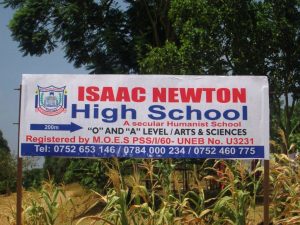 Isaac Newton High School in Uganda has been working on projecting the Humanist Ethos of the school to the local community and to visitors. It has a new school sign, which proclaims its Secular Humanist stance.
Isaac Newton High School in Uganda has been working on projecting the Humanist Ethos of the school to the local community and to visitors. It has a new school sign, which proclaims its Secular Humanist stance.
Peter Kisirinya, the Director of Isaac Newton School, explains that, “The active executive committee of our Humanist Students Association is planning voluntary activities around the school community this coming term that will involve improving sanitary conditions, teaching local people about disease prevention especially Malaria and HIV/AIDS and educating them about family planning methods“.
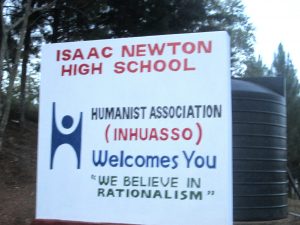 The students decided to use part of the money from a small grant from UHST to create signs to proclaim their Humanist Association. As you walk or drive up to the school gate, visitors are greeted by a welcome sign saying “We believe in rationalism“, and there is a similar sign wishing them a safe journey as they leave the school. On the school campus visitors will see a sign which proclaims in Luganda the Humanist commitment to self help. Invoking the spirit of an old Baganda saying:
The students decided to use part of the money from a small grant from UHST to create signs to proclaim their Humanist Association. As you walk or drive up to the school gate, visitors are greeted by a welcome sign saying “We believe in rationalism“, and there is a similar sign wishing them a safe journey as they leave the school. On the school campus visitors will see a sign which proclaims in Luganda the Humanist commitment to self help. Invoking the spirit of an old Baganda saying:
“Baganda Nkoba Za Mbogo- literally saying that “people from Buganda must strive on their own to get out of problems” – much as ropes cut from the skin of a dead buffalo are used to pull out a live buffalo found trapped in a pit.”
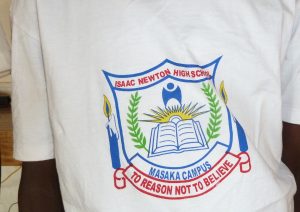 The school T-shirts (right) bears the school’s motto “To Reason not to Believe“.
The school T-shirts (right) bears the school’s motto “To Reason not to Believe“.
Following the very successful Humanist Ethos Project in 2015, all three Humanist Schools have been working to make the schools distinctive from the religious schools around them.
They now work to a common set of school rules in which the disciplinary code rejects violence in favour of guidance. Individual responsibility is encouraged and school conduct is based upon the promotion of an empathetic approach towards others. Guidelines have been agreed for the conduct of lessons to encourage students to become independent and autonomous learners, foster mutual respect among teachers and students and to encouraged a child-centred approach to learning. All three schools now expect new teachers to sign a pledge that they subscribe to this common understanding. Each school has appointed a Humanist Counsellor, whose job is to monitor and develop each school’s Humanist Ethos.
Humanist Student Associations, which have been set up in each school, encourage students to take part in activities that foster care for individuals and the wider community. Led by Robert Bwambale, the Director of Kasese Humanist Primary School, the schools have designated a set of special days where they celebrate important landmarks contributing to a better world, such as: World Environment Day, World Humanist Day, World Food Day, Darwin Day, World AIDS day, United National Day. At Kasese and Mustard Seed School the initial focus of the students association has been to work together to improve nutrition within the school by embarking on projects to rear chickens in order to increase the amount of protein in the diet of students – they see this as an example of self-help directed towards making things better for the wider student community as well as promoting the knowledge and skills of animal husbandry.
UHST very much welcomes these initiatives and we hope to be able to continue to provide some funds each year to help the student Humanist associations to develop into vibrant and attractive elements of school life, which help to draw each school closer to its local community.
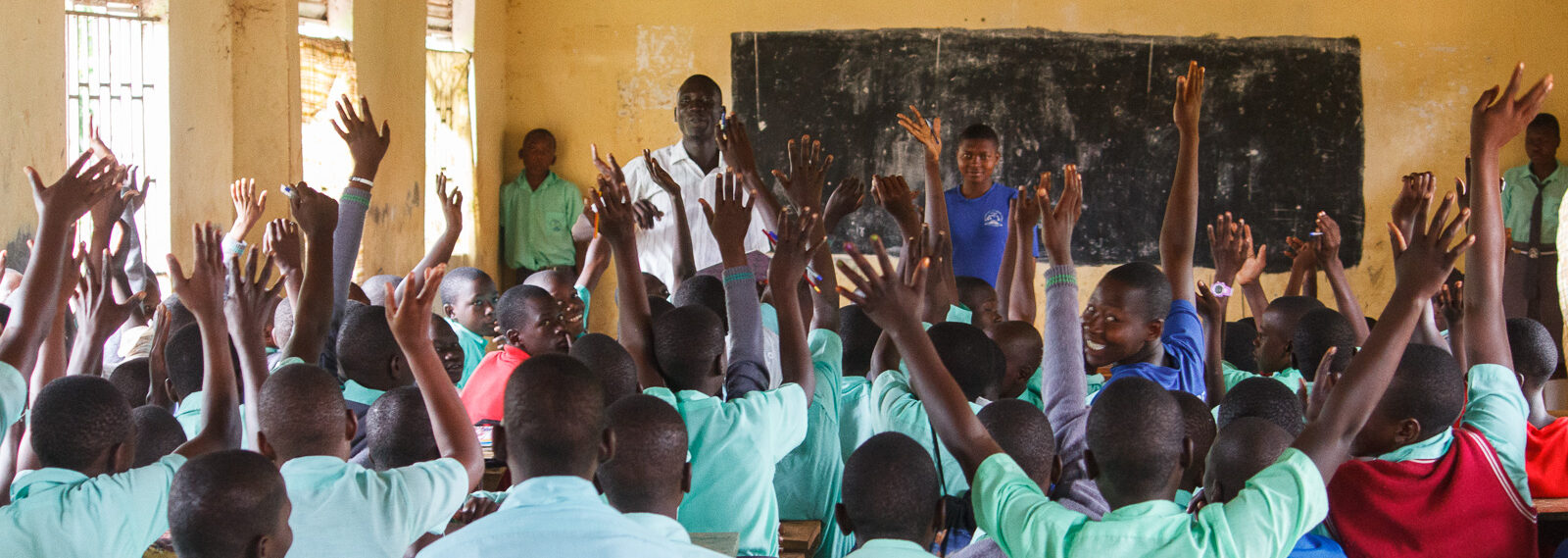
Posted: February 16, 2017 by Steve Hurd
Isaac Newton High School proclaims its Humanism
Peter Kisirinya, the Director of Isaac Newton School, explains that, “The active executive committee of our Humanist Students Association is planning voluntary activities around the school community this coming term that will involve improving sanitary conditions, teaching local people about disease prevention especially Malaria and HIV/AIDS and educating them about family planning methods“.
“Baganda Nkoba Za Mbogo- literally saying that “people from Buganda must strive on their own to get out of problems” – much as ropes cut from the skin of a dead buffalo are used to pull out a live buffalo found trapped in a pit.”
Following the very successful Humanist Ethos Project in 2015, all three Humanist Schools have been working to make the schools distinctive from the religious schools around them.
They now work to a common set of school rules in which the disciplinary code rejects violence in favour of guidance. Individual responsibility is encouraged and school conduct is based upon the promotion of an empathetic approach towards others. Guidelines have been agreed for the conduct of lessons to encourage students to become independent and autonomous learners, foster mutual respect among teachers and students and to encouraged a child-centred approach to learning. All three schools now expect new teachers to sign a pledge that they subscribe to this common understanding. Each school has appointed a Humanist Counsellor, whose job is to monitor and develop each school’s Humanist Ethos.
Humanist Student Associations, which have been set up in each school, encourage students to take part in activities that foster care for individuals and the wider community. Led by Robert Bwambale, the Director of Kasese Humanist Primary School, the schools have designated a set of special days where they celebrate important landmarks contributing to a better world, such as: World Environment Day, World Humanist Day, World Food Day, Darwin Day, World AIDS day, United National Day. At Kasese and Mustard Seed School the initial focus of the students association has been to work together to improve nutrition within the school by embarking on projects to rear chickens in order to increase the amount of protein in the diet of students – they see this as an example of self-help directed towards making things better for the wider student community as well as promoting the knowledge and skills of animal husbandry.
UHST very much welcomes these initiatives and we hope to be able to continue to provide some funds each year to help the student Humanist associations to develop into vibrant and attractive elements of school life, which help to draw each school closer to its local community.
Posted: February 1, 2017 by Steve Hurd
UHST 2016 Annual Report published
We are encouraged by the steady progress the Humanist Schools in Uganda are making.
UHST and the schools would like to thank all our supporters for their ongoing support, which has sustained the growth of these pioneering Humanist Schools in Uganda. They are really beginning to make a huge contribution to life in the communities of which they are part.
Educational standards have been steadily rising and the schools performance in national examinations has been better than many other schools in their Districts. The schools are attracting students from a wider area and, while this moves the schools towards sustainability, it is also pushing up class sizes to unsustainable levels.
In 2017 UHST is helping the schools to move to their next phase of development which will shift them from single to double stream entry. Having two classes in each year will make it necessary to double to the number of classrooms and to expand all other facilities, including the provision of books and other learning materials.
Our current appeal is for funds to construct at Isaac Newton School a multi-media block (with 3 news classrooms, a science lab, teachers’ development room and storerooms all wired for dataprojectors, computers, microphones and speakers to improve learning in large classes). Many supporters have already helped us to build the fund to £16,000.We are applying to another charity for matching funding but we would welcome any help you might be able to give us to attract further funds. If you would like to know more please contact Steve Hurd stevehurd@uhst.org.
Posted: January 12, 2017 by Steve Hurd
Humanist school power project promotes community cohesion
The installation of a reliable power source at the school will provide lighting for over 200 boarding students at night and provide power during the day for computers and audio-visual equipment. The local community will have electricity for lighting at night and to operate radios, TVs, power tools and other appliances and equipment. Isaac Newton High School’s prominent role in sourcing the funds has greatly enhanced the school’s standing in the community.
Peter’s latest initiative is to follow up the Power Project with the establishment of a new Community Based Organisation (CBO) to promote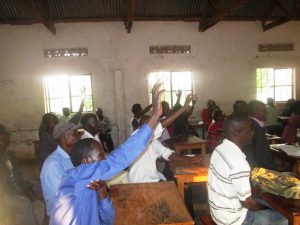 the economic and social development of the area. They held their first meeting, attended by 27 members of the community, on Monday 2nd January and a constitution was agreed the following Sunday. They adopted the name “Isaac Newton Community Based Initiatives: Improving Lives Through Sustainable Agricultural Practices” and voted in members of a governing body.
the economic and social development of the area. They held their first meeting, attended by 27 members of the community, on Monday 2nd January and a constitution was agreed the following Sunday. They adopted the name “Isaac Newton Community Based Initiatives: Improving Lives Through Sustainable Agricultural Practices” and voted in members of a governing body.
The aims include:
This whole community enterprise has been made possible by the creation of this Humanist School at the heart of the community and the huge esteem and trust which Peter Kisirinya has earned over the past ten years. It is a tremendous testimony to Peter’s dedication and it is wonderful to see his very ambitious early humanist visions coming to fruition.